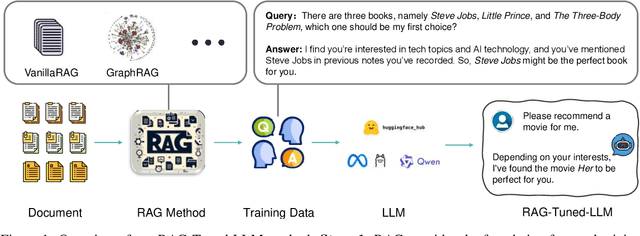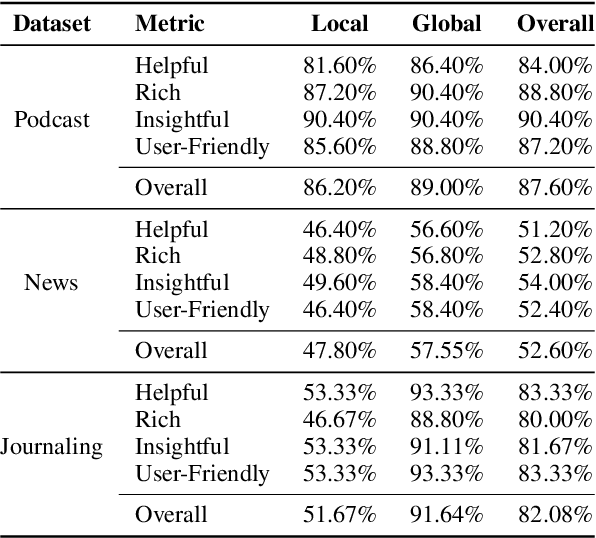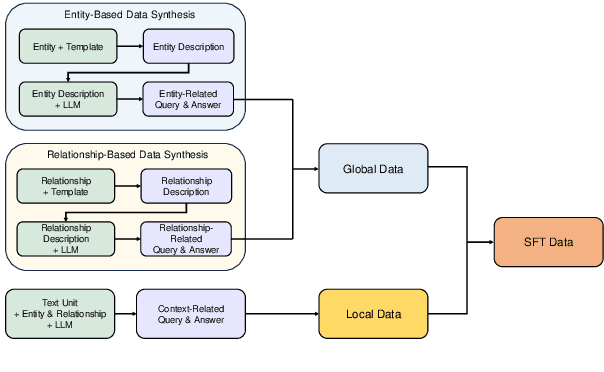Shuchi Wu
Tuning LLMs by RAG Principles: Towards LLM-native Memory
Mar 20, 2025



Abstract:Memory, additional information beyond the training of large language models (LLMs), is crucial to various real-world applications, such as personal assistant. The two mainstream solutions to incorporate memory into the generation process are long-context LLMs and retrieval-augmented generation (RAG). In this paper, we first systematically compare these two types of solutions on three renovated/new datasets and show that (1) long-context solutions, although more expensive, shall be easier to capture the big picture and better answer queries which require considering the memory as a whole; and (2) when the queries concern specific information, RAG solutions shall be more competitive especially when the keywords can be explicitly matched. Therefore, we propose a novel method RAG-Tuned-LLM which fine-tunes a relative small (e.g., 7B) LLM using the data generated following the RAG principles, so it can combine the advantages of both solutions. Extensive experiments on three datasets demonstrate that RAG-Tuned-LLM can beat long-context LLMs and RAG methods across a wide range of query types.
EmInspector: Combating Backdoor Attacks in Federated Self-Supervised Learning Through Embedding Inspection
May 21, 2024



Abstract:Federated self-supervised learning (FSSL) has recently emerged as a promising paradigm that enables the exploitation of clients' vast amounts of unlabeled data while preserving data privacy. While FSSL offers advantages, its susceptibility to backdoor attacks, a concern identified in traditional federated supervised learning (FSL), has not been investigated. To fill the research gap, we undertake a comprehensive investigation into a backdoor attack paradigm, where unscrupulous clients conspire to manipulate the global model, revealing the vulnerability of FSSL to such attacks. In FSL, backdoor attacks typically build a direct association between the backdoor trigger and the target label. In contrast, in FSSL, backdoor attacks aim to alter the global model's representation for images containing the attacker's specified trigger pattern in favor of the attacker's intended target class, which is less straightforward. In this sense, we demonstrate that existing defenses are insufficient to mitigate the investigated backdoor attacks in FSSL, thus finding an effective defense mechanism is urgent. To tackle this issue, we dive into the fundamental mechanism of backdoor attacks on FSSL, proposing the Embedding Inspector (EmInspector) that detects malicious clients by inspecting the embedding space of local models. In particular, EmInspector assesses the similarity of embeddings from different local models using a small set of inspection images (e.g., ten images of CIFAR100) without specific requirements on sample distribution or labels. We discover that embeddings from backdoored models tend to cluster together in the embedding space for a given inspection image. Evaluation results show that EmInspector can effectively mitigate backdoor attacks on FSSL across various adversary settings. Our code is avaliable at https://github.com/ShuchiWu/EmInspector.
Refine, Discriminate and Align: Stealing Encoders via Sample-Wise Prototypes and Multi-Relational Extraction
Dec 01, 2023



Abstract:This paper introduces RDA, a pioneering approach designed to address two primary deficiencies prevalent in previous endeavors aiming at stealing pre-trained encoders: (1) suboptimal performances attributed to biased optimization objectives, and (2) elevated query costs stemming from the end-to-end paradigm that necessitates querying the target encoder every epoch. Specifically, we initially Refine the representations of the target encoder for each training sample, thereby establishing a less biased optimization objective before the steal-training phase. This is accomplished via a sample-wise prototype, which consolidates the target encoder's representations for a given sample's various perspectives. Demanding exponentially fewer queries compared to the end-to-end approach, prototypes can be instantiated to guide subsequent query-free training. For more potent efficacy, we develop a multi-relational extraction loss that trains the surrogate encoder to Discriminate mismatched embedding-prototype pairs while Aligning those matched ones in terms of both amplitude and angle. In this way, the trained surrogate encoder achieves state-of-the-art results across the board in various downstream datasets with limited queries. Moreover, RDA is shown to be robust to multiple widely-used defenses.
 Add to Chrome
Add to Chrome Add to Firefox
Add to Firefox Add to Edge
Add to Edge